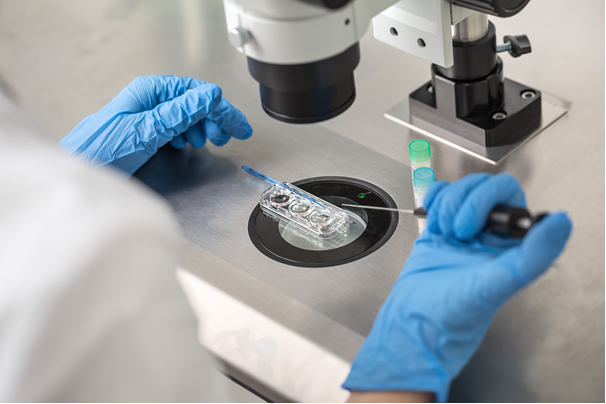Male Factor Infertility
When speaking about infertility, the focus is often on female factors. However, the reality is it males are approximately responsible for 40–50 per cent of cases of infertility!
After a female’s age, male infertility factor is the second most common reason a couple may have difficulty conceiving. According to researches, as many as one in five healthy young men between the ages of 18 and 25 produce abnormal sperm counts. The most effective way to assess a man’s fertility is via a male fertility test called a Semen Analysis. This is why Team Miracle recommends a simple semen analysis as one of the first tests an infertile couple should do. Besides being inexpensive, semen analysis also produces essential information that can help the fertility expert assess the case better and suggest a proper path of action.

What Causes of Male Infertility?
A man’s fertility generally relies on the quality and quantity of his sperm.
The primary causes of male infertility include a low number of sperm production, abnormal sperm function, sexual problems (erection and ejaculation problems), hormonal issues, sperm antibodies or blockage of sperm transport. However while these issues are sometimes the result of underlying health problems, there are also certain lifestyle choices which may influence a man’s fertility, such as wearing tight or restrictive underwear or smoking tobacco, alcohol, or other drugs.
Are there any signs of male infertility?

In most cases, there may not be apparent signs or symptoms of male infertility. Many men are not aware they have fertility problems until they attempt to conceive with a partner. Intercourse, ejaculation and erections will usually happen without difficulty. The quantity and appearance of the ejaculated semen generally appear normal to the naked eye. That’s why male infertility can diagnose, after testing both partners.
What are the diagnoses of male infertility?
- The first step diagnostic process for men start with a thorough physical examination, patient interview, and medical history, all of which may provide insight into contributing factors.
- The next step is usually a sperm analysis, where Team Miracle tests a sperm sample in the lab at Cyprus IVF Centre. Our Clinical Embryologist, will perform a sperm count, check the health, shape, and act of the sperm, and can help to determine the best way of action.
What is the treatment of male factor infertility?
There are many ways that at Cyprus IVF Centre can treat male infertility, depending on the cause of the problem.
Intracytoplasmic Sperm Injection (ICSI)
ICSI is the best option for men with motility issues. In the usual conception, sperm must travel from the female’s vagina and make their way to the fallopian tube where the egg will be waiting for fertilisation. Contrary to what is generally believed, there is only a window of approximately 12 hours for successful fertilisation to occur so, even if intercourse is timed perfectly, sperm with poor motility will never make it to the egg in time. In ICSI, we inject a single sperm directly into the egg to fertilise it. This means that even an immotile sperm can be used for fertilisation. To select the best sperm, our expert embryologists analyse the sample under the microscope and choose the sperm with the best appearance. After the injection of the sperm, the egg is then placed in a lab dish and kept in the safe environment of an incubator, where the temperature is controlled, so that the fertilisation can occur. About 3 or 5 days after the collection of the egg, the embryo is transferred into the mother’s uterus.
This method has already brought lots of success even to men with the severest degrees of male infertility, considering the impressively high success pregnancy rates. We only need a single sperm to fertilise each egg, which makes motility no longer a factor in fertilisation with ICSI.
Intracytoplasmic Morphologically-Selected Sperm Injection (IMSI)
Sperm quality disorders range from low motility or count to a total absence of sperm production. As for the sperm’s morphology (shape of the sperm cell), it is a very important factor that reflects the sperm’s ability to fertilise the egg. Abnormal sperm will struggle to fertilise the egg or may create an abnormal embryo leading to miscarriage. For men with a very low normal morphology there is a high chance of fertilisation failure, so we need more specialised treatments, such as IMSI.
During the IMSI process, sperm samples are analysed by our Clinical Embryologist using a high powered microscope which is close to 6000 times more effective than the standard ICSI microscopes.
The IMSI technique enables the Team Miracle embryologists to select the very best quality sperm from the sample provided to inject into each egg, thereby increasing the fertilisation rate, the success of implantation and, more importantly, the live birth rate.
TESE (Testicular Sperm Extraction)
TESE is an excellent option that can both diagnose and treat severe cases, especially of men that have had a vasectomy or a failed reversed vasectomy. The Team Miracle urologist will biopsy the testicle to extract sperm cells from the testicular tissue. The embryologist will then select the best sperm and inject them into the eggs via the ICSI procedure. The 15-minute TESE procedure at the Cyprus IVF Centre is conducted under local anaesthesia, and men report feeling little to no discomfort afterwards.
PESA (Percutaneous Epididymal Sperm Aspiration)
During this procedure, we extract fluid from the epididymis (the narrow tube that carries sperm from the testes to the ductus deferens). Then Team Miracle embryologists analyse that fluid and select the best sperm for ICSI. Although this procedure can be done under local or general anaesthesia, we strongly recommend the first which, along with sedation, gives a much faster recovery and minimises potential side effects significantly.

MESA (Micro-epididymal Sperm Aspiration)
With MESA, Sperm is also retrieved directly from the epididymis and used to immediately conduct ICSI by the Team Miracle embryologist at Cyprus IVF Centre to increase fertilisation chances. This method uses a surgical microscope. MESA yields high amounts of motile sperm. They can be frozen and thawed later for IVF treatments.
In addition to the medical procedures, there are many supplementary extras to help extreme cases of male infertility.For example, Team Miracle at Cyprus IVF Centre is the only hospital on the island to offer FertilePlus® sperm selection to patients.Our doctor at Cyprus IVF Centre is the only doctor in Cyprus who is able to offer FertilePlus® technology. Fertile Plus optimises the process for sperm washing, swimming and gradient centrifuging. It also selects sperm with best DNA and physiological qualities making it an ideal supplemental treatment for men with high levels of DNA fragmentation.
You can ask your patient coordinator at Cyprus IVF Centre to explain all the options if you are seeking treatment for male factor infertility.
So don’t despair if conception doesn’t happen readily; at the Cyprus IVF Centre, Team Miracle work continuously towards granting your wish to start a happy family.
Please do not hesitate to contact Team Miracle.





